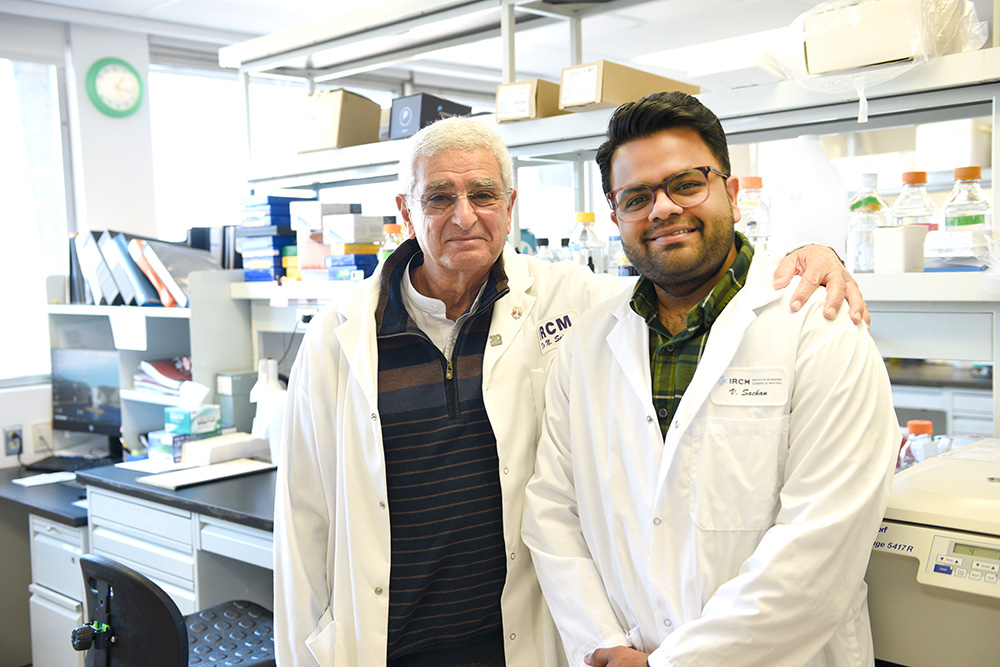Cracking the enzyme puzzle: A Canadian breakthrough in treating heart disease, non-alcoholic fatty liver, and cancer

Dr. Nabil Seidah and his PhD student Vatsal Sachan (Photographer: Hélène Lambin)
Every time you digest your breakfast, fight off a cold, or remember a phone number, certain proteins step in to help. But they can't do their job alone. They need special sidekicks: enzymes called proprotein convertases.
The existence and role of proprotein convertases in these essential processes were a mystery until the 1970s, when Dr. Nabil G. Seidah, a biologist at Université de Montréal and the Montreal Clinical Research Institute, began researching what activates the proteins that keep our bodies functioning.
Since then, Dr. Seidah's team has identified seven of the nine enzymes in the proprotein convertase family, including the 7th and 9th members—named PCSK7 and PCSK9. With support from the Canadian Institutes of Health Research, his work has transformed how we treat heart disease, liver conditions, and even cancer.
In 2003, Dr. Seidah's team and French researchers Drs. Catherine Boileau and Marianne Abifadel were investigating whether PCSK9 affected cholesterol metabolism. They made the remarkable discovery that PCSK9 is directly implicated in cardiovascular and heart diseases.
Their study revealed that a relatively common genetic mutation in PCSK9 enhanced the degradation of proteins called LDL-receptors, which help the liver clear the 'bad' cholesterol from the bloodstream. "Fewer LDL-receptors mean that the bad cholesterol has nowhere else to go, leading to elevated LDL-cholesterol levels and increased cardiovascular risk," explains Dr. Seidah.
When new research identified healthy individuals with a rare genetic mutation that turned off PCSK9, his pre-clinical studies confirmed that it was possible to block PCSK9 without major health impacts.
This marked the beginning of a breakthrough. By understanding that genetic mutations in PCSK9 lead to high LDL-cholesterol, Dr. Seidah and his collaborators paved the way for a new class of drugs—antibodies targeting PCSK9.
Now approved in Canada and available in 40 countries, these drugs can reduce high cholesterol levels by up to 70% and, as a result, help treat and prevent cardiovascular disease. "They are life-saving solutions for patients who may not respond well to conventional treatments like statins," he says.
Continuing his exploration of proprotein convertases, Dr. Seidah's team recently investigated novel RNA-based therapies that silence genes linked to proprotein convertases to treat non-alcoholic fatty liver disease, a condition affecting nearly one-third of Canadians.
A recent study from his lab found that removing another enzyme, PCSK7, reversed fat accumulation and scarring in the liver—symptoms of non-alcoholic fatty liver disease. "Currently, there are no drugs that reverse liver fibrosis, but our results provide the first evidence that a new treatment may be possible," says Dr. Seidah.
His pre-clinical research on colon cancer is also opening the door to new therapeutic approaches. By silencing the genes responsible for PCSK7 and PCSK9 in animal models and human cells, his team was able to reduce inflammation, growth of tumors and their liver metastasis, and to boost the immune system. "PCSK7 and PCK9 are promising targets for cancer immunotherapy," he explains.
What began as Dr. Seidah's search to understand how proteins function has led to life-saving therapies—offering new options and renewed hope for millions of patients worldwide.
At a glance
Issue
Individuals born with a relatively common mutation affecting PCSK9 are at higher risk of cardiovascular disease because their bodies can't clear the 'bad' cholesterol as well. Although statins can help, they may not be enough for these individuals.
Research
Dr. Seidah and his collaborators discovered the role of PCSK9 in cholesterol metabolism, and this research paved the way for a new class of drugs—antibodies targeting the mutated PCSK9. Now approved in Canada and available in 40 countries, these drugs can reduce cholesterol levels by up to 70%. Continuing his research on PCSK9 and the related protein convertase PCSK7, Dr. Seidah and his team are also identifying potential treatments for fatty liver disease and cancer.
Dr. Seidah has been a member of the Ordre national du Québec since 1997, and of the Order of Canada since 1999.
- Date modified: